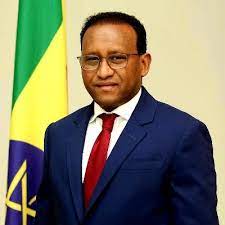Ethiopia adheres to equitable utilization of trans-boundary water: Ambassador Jemal Beker Abdula

Islamabad: Ambassador of Ethiopia to Pakistan Jemal Beker Abdula has said that his country fully adhered to the international rule of equitable and reasonable utilization of trans-boundary water.
“As far as, the Nile River water is concerned, Ethiopia is determined to follow international rules, treaties and conventions, but we do not recognize any treaty to which Ethiopia is not the party,” the ambassador said while delivering a lecture on international water law, hydro-politics and hydro-diplomacy at a workshop titled “Winter School for International Law”.
The “Winter School for International Law” was hosted by the Islamabad Policy Research Institute (IPRI) in collaboration with the Research Society of International law.
At the outset of his lecture, the ambassador elucidated the terms of hydro-politics and hydro-diplomacy and shed light on this subject’s evolution in the last couple of decades.
He also informed the audience about the existing international water laws and treaties, the United Nations Watercourse convention, and theories regarding the use of shared transboundary water resources.
Around the world, he said three-quarters of UN Member States shared rivers or lake basins with their neighbors.
“There are more than 270 shared river basins, which provide freshwater for almost 40% of the globe’s population, including the Nile, the Indus, the Ganges, the Euphrates-Tigris, and the Mekong.”
As regards the inter-state relations of the African continent in the context of shared water resources, he said the Nile River was the longest transboundary river in the world whose water was shared among 11 countries including Tanzania, Uganda, Rwanda, Burundi, The Democratic Republic of the Congo, Kenya, Ethiopia, Eritrea, South Sudan, Sudan, and Egypt.
The ambassador said during the last two centuries, several treaties were concluded in respect of the Nile River, which Egypt has been invoking to justify their ‘right’ to the use of the waters of the Nile River.
He said Ethiopia was not the party to any of these treaties, however, it directly and actively participated in the Nile Basin Initiative (NBI) forum which was established in 1999 to “achieve sustainable socio-economic development through equitable and reasonable utilization of, and benefit from the shared Nile Basin water resources.”
The ambassador said the NBI produced a draft agreement called the Cooperative Framework Agreement (CFA) after a decade-long extensive negotiation among the riparian countries with the help of WB, UNDP, and other donors.
The Comprehensive Framework Agreement entailed, reflected, and contained the international water laws and principles such as equitable, reasonable, and fair utilization of water, do no harm rule, the obligation to protect the ecosystem, the principle of cooperation, and the obligation to share information and exchange data that end the monopoly of Nile River and begin the new era of cooperation.
He said the upper riparian countries of the Nile River including Ethiopia, Tanzania, Kenya, Uganda, Rwanda, and Burundi had signed the CFA and agreed to utilize more of the Nile’s water resources based on the international water laws, instruments, and principles mentioned above.
To this end, Ethiopia has taken a decisive measure of confidence restoring by establishing an International Panel of Expert, and a National Independent Scientific Research Group (Egypt, Ethiopia, and Sudan) to conduct scientific studies on the impacts of the Dam in which Ethiopia accept the outcome of the study.
The ambassador said Ethiopia had built the Grand Ethiopian Renaissance Dam in line with international water laws, the UN watercourse convention, NBI, CFA, and the Declaration of Principles (2015). It was the largest hydro dam in Africa and 10th in the world which would eventually generate 6500MW of clean energy.
He said the Grand Ethiopian Renaissance Dam would be a game changer for the entire African region as it would promote regional integration through the transfer of clean energy.
It would also hold sedimentation in the countries such as Egypt and Sudan and also help avert drought and flood low riparian states with huge storage capacity while it also reduces evaporation.
He also shared Ethiopia’s perspective on the Nile River dispute and presented an analysis of the transboundary issue in the Nile River Basin and the benefits of the Grand Renaissance Dam for all the states in the African region.
H.E. Jemal Beker Abdula said Ethiopia was ready to uphold and continue the trilateral negotiations under the auspices of the African Union.
“There is no agreement restricting Ethiopia’s right to exploit the water within its territory, including the construction of a dam taking into account the principles of equitable and reasonable utilization and do no significant harm principles.”
He said Ethiopia believed that all the riparian countries in the Nile River were connected through the Nile blood and would work together to achieve win-win cooperation that will transform the entire region and form the whole Nile Community.





